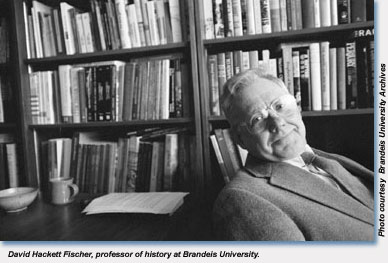Many have attempted to establish a doubtful question by a phrase such as
- most historians agree . . .
- it is the consensus of scholarly opinion that . . .
- in the judgment of all serious students of this problem . . .
The fallacy of the prevalent proof makes mass opinion into a method of verification. This practice has been discovered by cultural anthropologists among such tribes as the Kuba, for whom history was whatever the majority declared to be true. If some fearless fieldworker were to come among the methodological primitives who inhabit the history departments of the United States, he would find that similar customs sometimes prevail. There are at least a few historians who would make a seminar into a senate and resolve a professional problem by resorting to a vote. I witnessed one such occasion (circa 1962) as a student at the Johns Hopkins University. A scholar who was baffled by a knotty problem of fact literally called for a show of hands to settle the question. An alienated minority of callow youths in the back of the room raised both hands and carried the day, in defiance of logic, empiricism, and parliamentary procedure.
If the fallacy of the prevalent proof appeared only in this vulgar form, there would be little to fear from it. But in more subtle shapes, the same sort of error is widespread. Few scholars have failed to bend, in some degree, before the collective conceits of their colleagues. Many have attempted to establish a doubtful question by a phrase such as “most historians agree . . . ” or “it is the consensus of scholarly opinion that . . .” or “in the judgment of all serious students of this problem . . . .”
A historian has written, for example, “While the role of dope in damping social unrest in early industrial England has not been extensively investigated, every historian of the period knows that it was common practice at the time for working mothers to start the habit in the cradle by dosing their hungry babies on laudanum (‘mother’s blessing,’ it was called).” This statement is often made, and widely believed. But it has never, to my knowledge, been established by empirical evidence. The reader should note the hyperbole in the first sentence. When an historian asserts that “X has not been extensively investigated,” he sometimes means, “I have not investigated X at all.”
A fact which every historian knows is not inherently more accurate than a fact which every schoolboy knows. Nevertheless, the fallacy of the prevalent proof commonly takes this form–deference to the historiographical majority. It rarely appears in the form of an explicit deference to popular opinion. But implicitly, popular opinion exerts its power too. A book much bigger than this one could be crowded with examples. One will suffice here, for the sake of illustration. Every schoolboy knows, and most schoolmasters, too, that Mussolini made the trains run on time. But did he? Ashley Montagu observes that “there was little or no truth in it: people who lived in Italy between the March on Rome (October 22, 1922) and the execution at Como (1945) will bear testimony to the fact that Italian railroads remained as insouciant as ever with regard to time-tables and actual schedules.” And yet, the myth still runs its rounds, with a regularity that Il Duce was unable to bring to his railroads.
The above is from Historians’ fallacies: toward a logic of historical thought (pages 51-53) by the renowned historian David Hackett Fischer. (That title link is to an open access copy of the book on archive.org)

If you enjoyed this post, please consider donating to Vridar. Thanks!

One thought on “The Fallacy Few Historians Have Avoided”